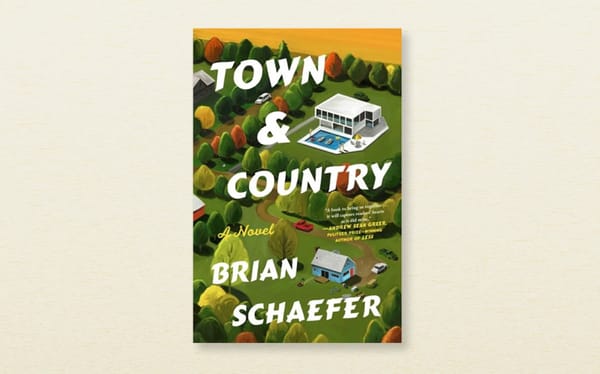Town & Country: Brian Schaefer’s Hudson Valley Novel
A reading and signing will be held at Spark of Hudson on November 8 at 6pm.

A reading and signing will be held at Spark of Hudson on November 8 at 6pm.

In Brian Schaefer’s debut novel Town & Country (Atria Books), a religiously devout realtor named Diane Riley ushers a potential buyer—fresh from the city, brimming with enthusiasm (quite possibly gay)—through a deconsecrated church in the town of Griffin, loosely modeled on the city of Hudson. The stained-glass windows cast rainbows across the hardwood; the pulpit has been reborn as a bar. The man calls the whole thing “kind of camp,” and Diane, who has tucked her rhinestone cross into her blouse to avoid spooking her client, smiles gamely. while privately mourning the spiritual real estate lost to design trends and disposable weekend whims. She used to call the sour aftertaste of selling off parts of her home town to well-heeled newcomers “remorse”—profiting from a transformation she resents. “Now she calls it defiance,” Schaefer writes.
If you’ve lived in the Hudson Valley long enough, you’ll recognize the ache. The region’s renaissance has a pulse; it also has a shadow. We who live here (full-time, part-time, or those nether regions in between) perform belonging constantly. It is an emotional, architectural sport. Diane is one of Schaefer’s most compelling avatars in his kaleidoscopic book because she’s not a type; she’s a person making peace with contradiction while praying nobody sees the seams.
“I wasn’t interested in demonizing anyone,” Schaefer told me when we spoke recently. He’s a longtime cultural journalist—dance, theater, the arts—and splits his time between Manhattan and Ancram. “The story demanded multiple perspectives. I knew the region wasn’t as simple as locals-good/newcomers-bad. I see people up here who care about their neighbors, who want to engage. I wanted to capture that complexity.”
That word again. Complexity. We trot it out so often around here it risks becoming a brand position. But Schaefer earns it. Town & Country follows six characters over six months leading up to a congressional race. The political plot is a scaffolding; the human plot is what matters. In a lesser writer’s hands this might have been satire, a bat swung at the brunch crowd. Schaefer started there, he admits—“I was approaching it as satire”—but the pandemic years and the tenor of our discourse softened the impulse to sneer. “It felt almost more subversive to take a generous approach,” he says.

Schaefer worked the book like a reporter. He interviewed farmers. Learned to milk a cow. Sat in bars. Attended overdose-reversal trainings. Observed. Took notes. “It’s how I enter a story,” he says, and indeed Town & Country has the patience of journalistic observation without the starch. The novel breathes. Characters lie to themselves in small, human ways. Gossip fills silence where truth might otherwise sit. The opioid epidemic exists alongside Pride brunches and river-view yoga classes, neither cancelling the other out.
The Rileys—Diane, her bar-owner husband Chip, and their two sons—anchor the emotional landscape. Chip is running for Congress; Diane is quietly selling the very future he campaigns on protecting. Their older son, Joe, carries unspoken grief and addiction like a secondary atmosphere. “I was interested in juxtaposing the AIDS epidemic and the opioid epidemic—the stigma, the shame, the isolation.” Joe’s ache, his estrangement, is written with the sensitivity of someone who understands how loneliness constructs its own geography.
Which brings us to Will, the younger son, and the novel’s queer arc. Here, too, Schaefer resists the easy narrative of escape to the city as queer salvation. Will is seduced by the glamour of the weekend crowd, then surprised to find his way back to the soil of home—not as regression, but as clarity. “I wanted to play with that trope,” Schaefer says. “That there can be self-discovery in the city, and also a deeper pride in where you came from.”
This is the quiet thesis of Town & Country: belonging isn’t location, it’s labor. Not a static condition, but a practice. And that practice, in Schaefer’s telling, requires grace. Not the saccharine kind, nor the performative kind—the gritty, daily, choose-to-stay-in-relation kind. “The hope is in the characters choosing not to close the door,” he said.
The novel ends on election night. When I finished the book, I realized that the election result—what we are trained to treat as the climax of civic life—barely matters. What matters is the civic work at the dinner table, at the bar, in the pew that has been repurposed as a dining bench in someone else’s dream of rural chic. Politics is personal not because every decision is ideological, but because every emotion is political when you share a town.
Schaefer believes in the long, unglamorous work of staying. “Relationships take time,” he said. “You have to resist the urge to dismiss someone based on one issue, one impression.” It is perhaps the least fashionable position in American letters right now: that hope isn’t naive, just slow.
At Spark of Hudson, 502 Union Street in Hudson, Brian Schaefer will read from Town & Country and be in conversation with Mat Zucker, host of the “Cidiot” podcast on November 8 at 6pm. RSVP.